RERO
IBID. (WANING OF IDEALS)
IBID. (ÉPUISEMENT DES IDÉAUX)
from January 5 to February 25, 2017
Publication of a monograph, IBID 2007-2017, 230 p., limited and signed edition, 150 ex.
\
du 5 janvier au 25 février 2017
Parution d'une monographie inédite, IBID 2007-2017, 230 p., édition limitée et signée de 150 ex.


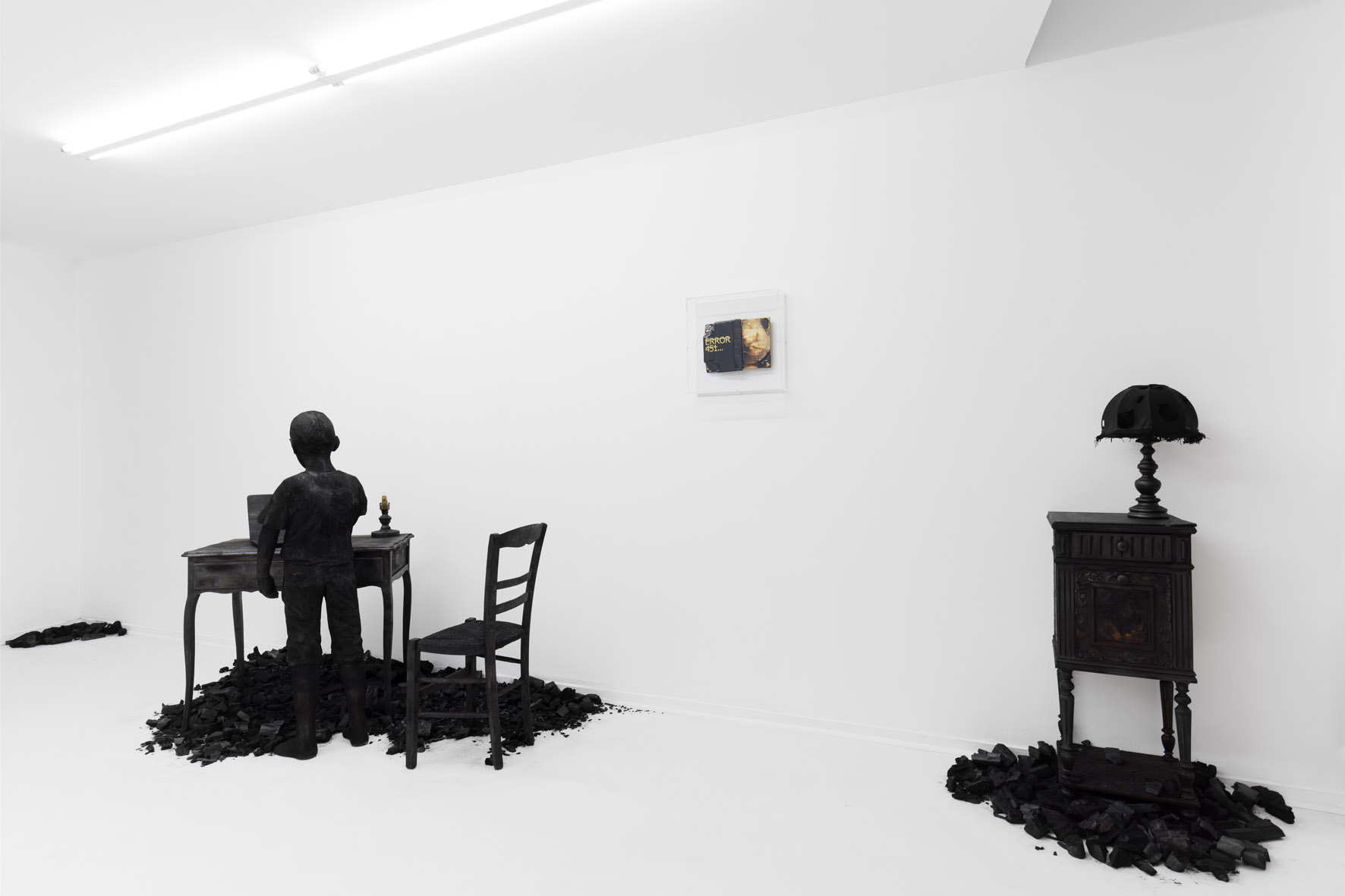
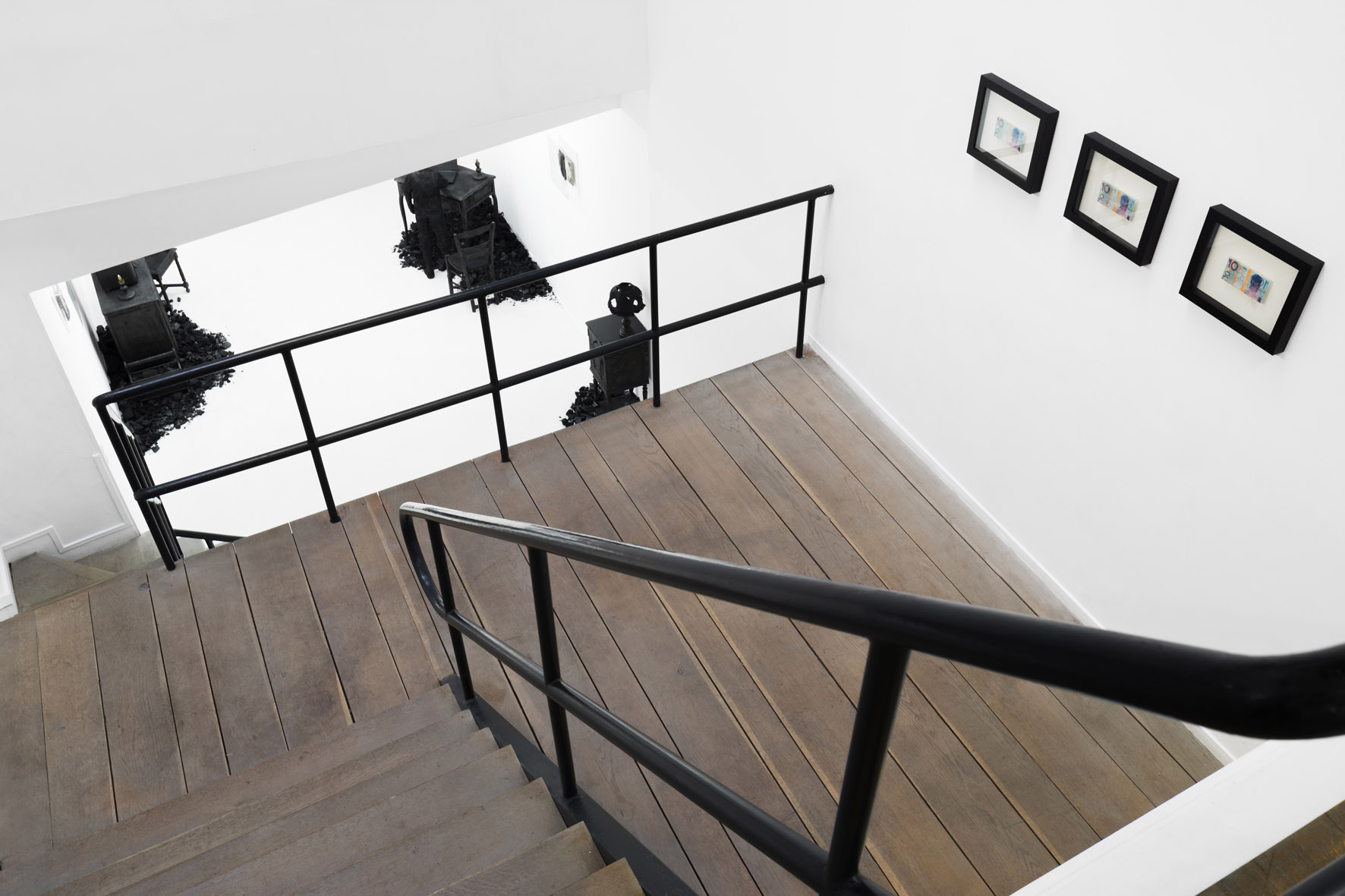

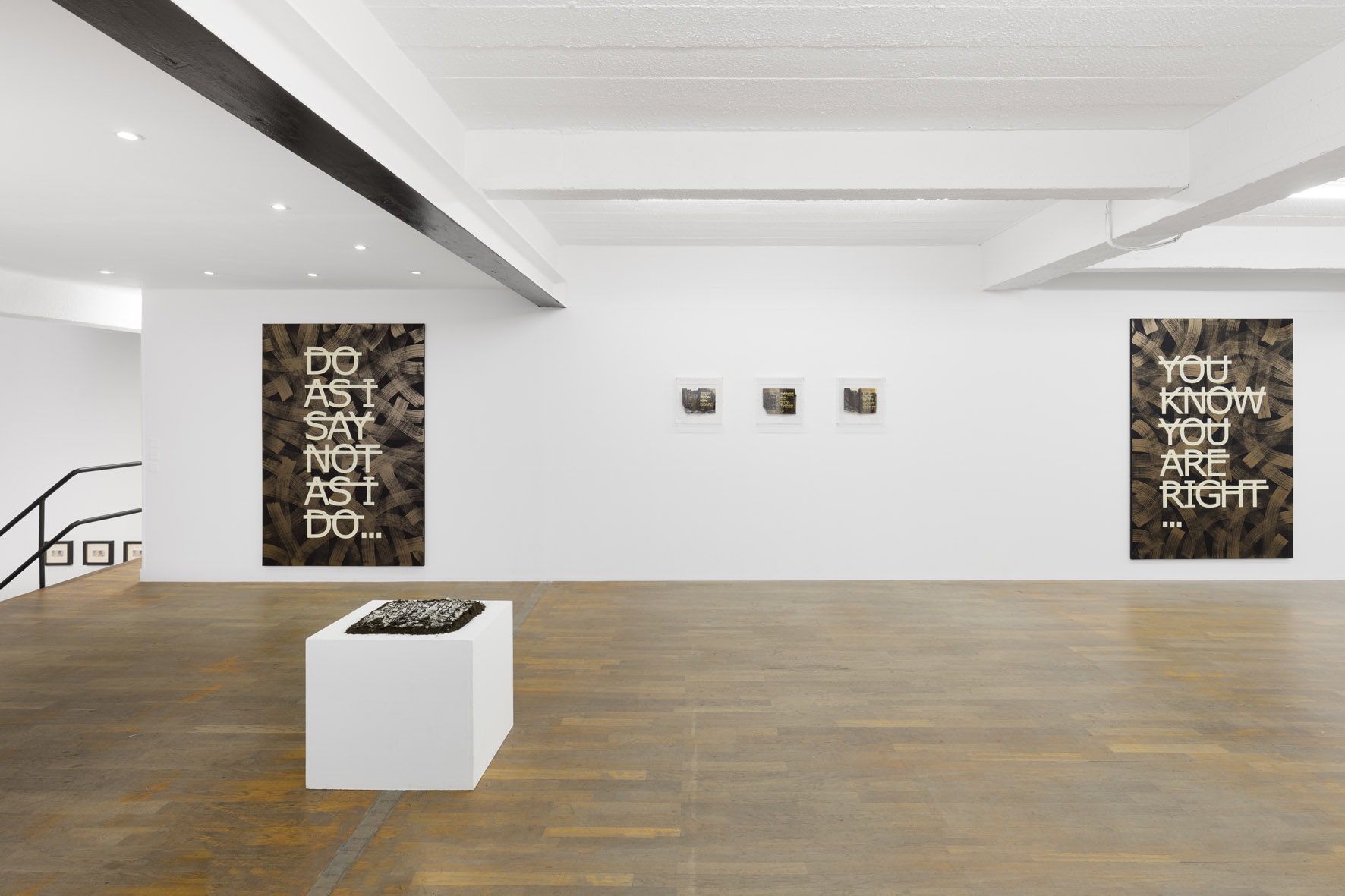
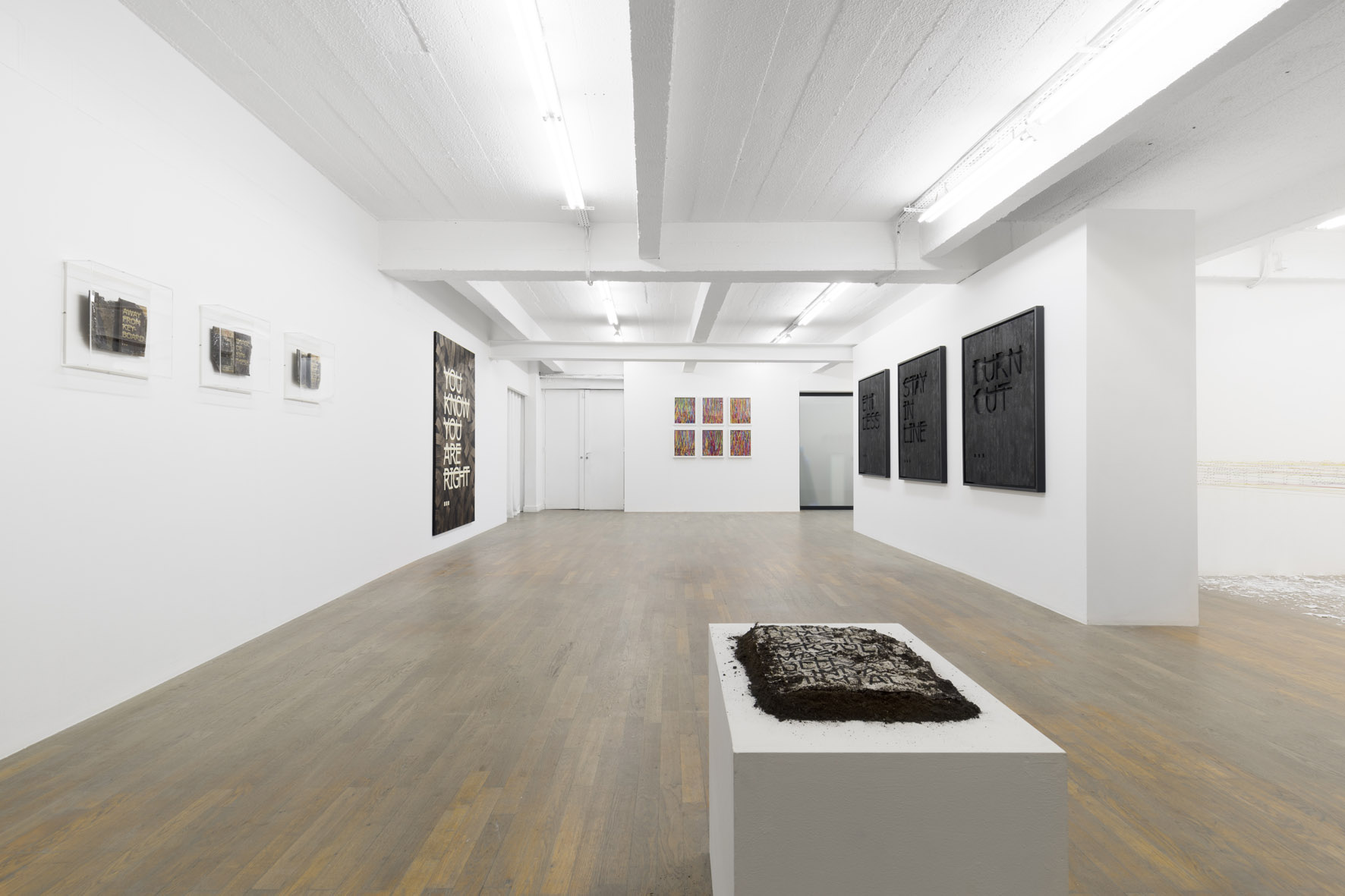
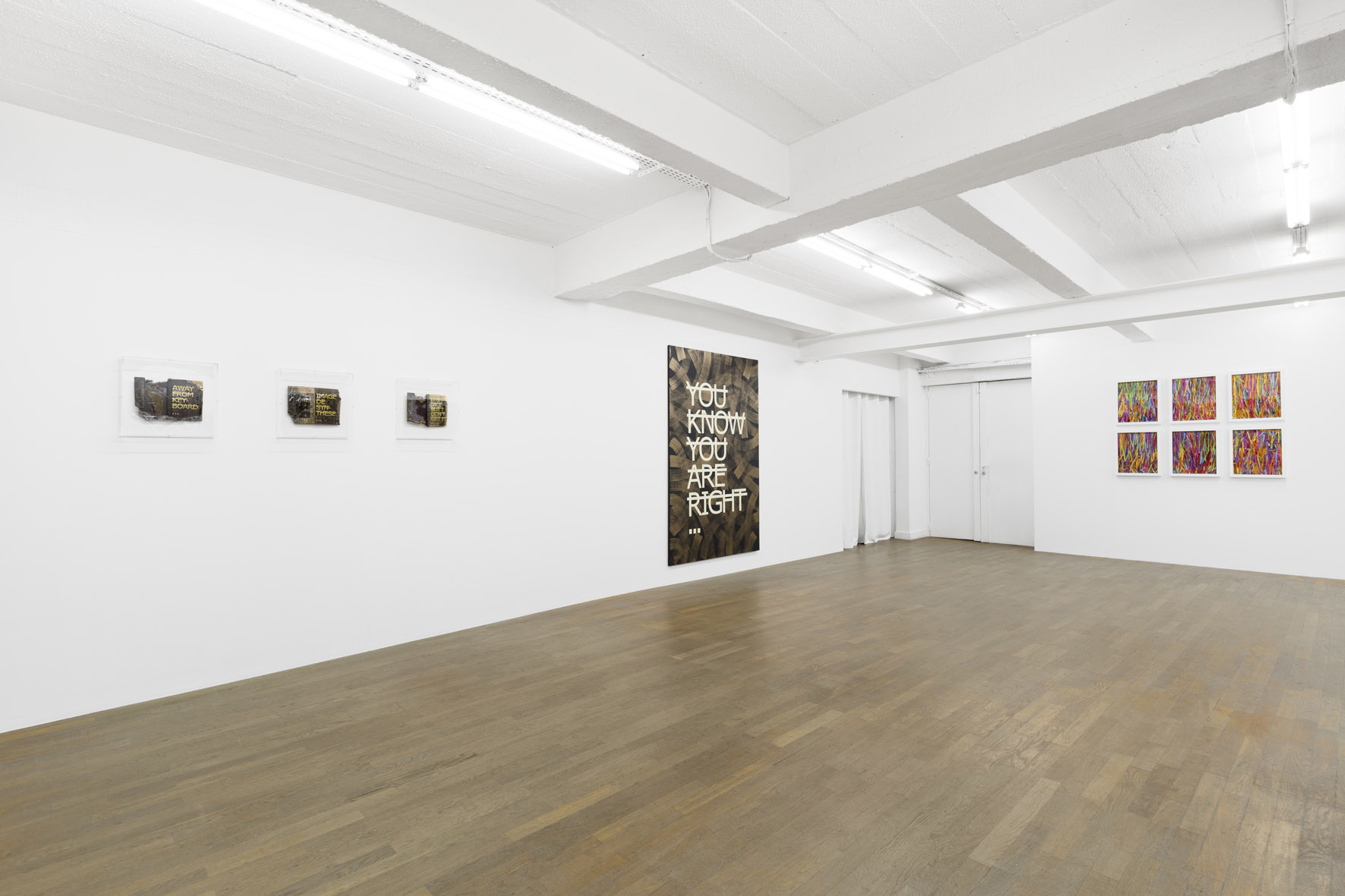

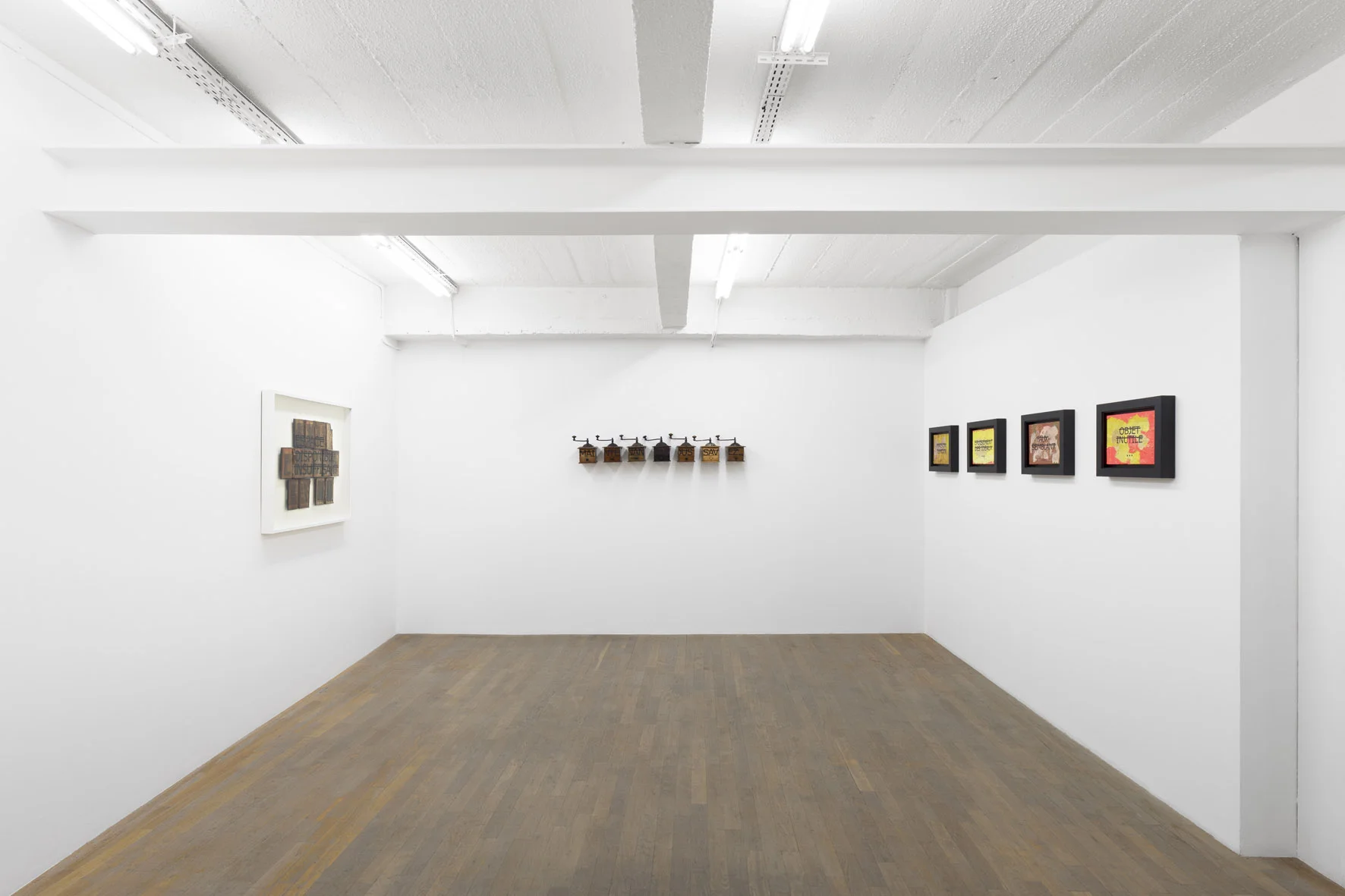

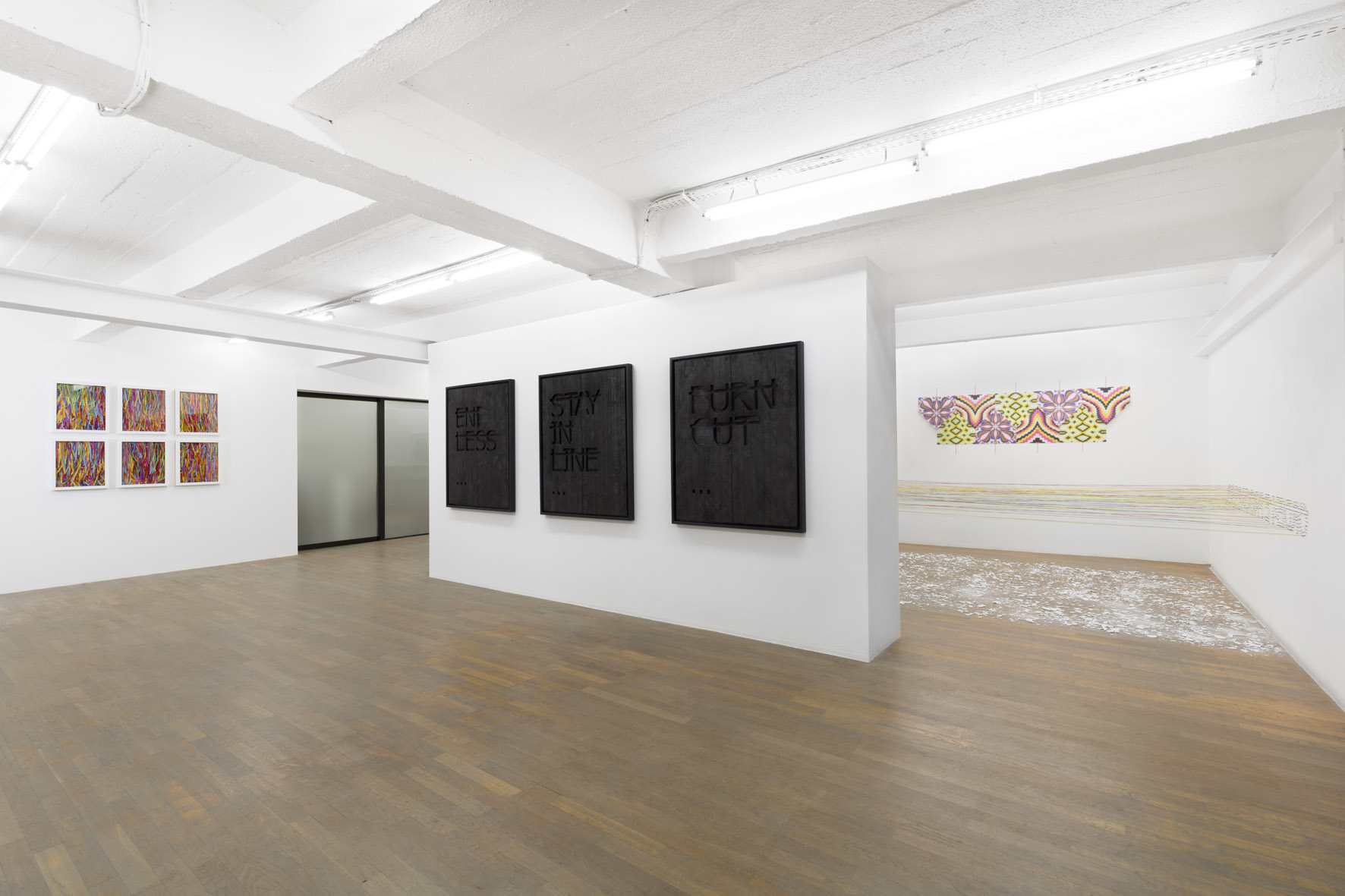
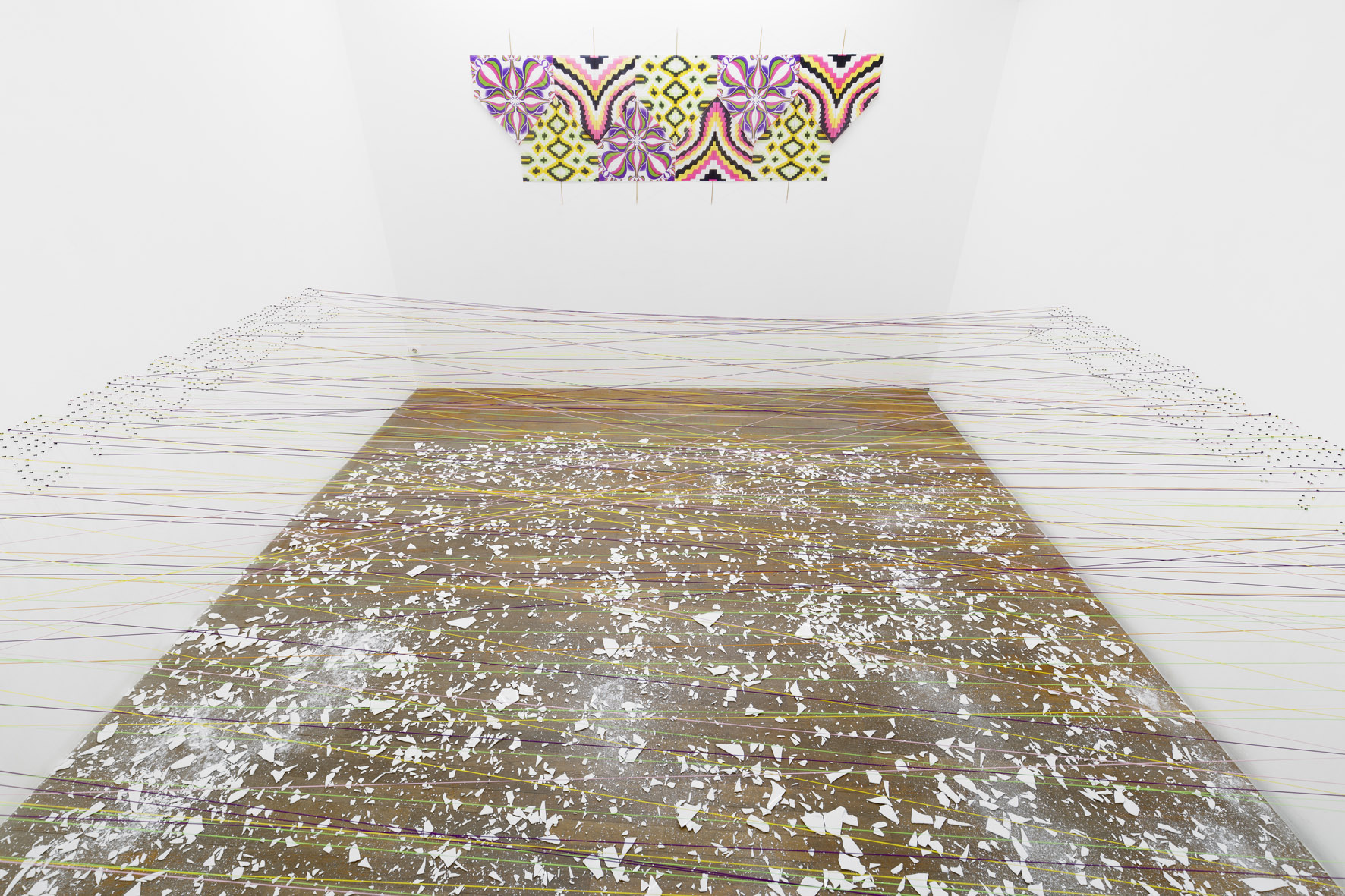
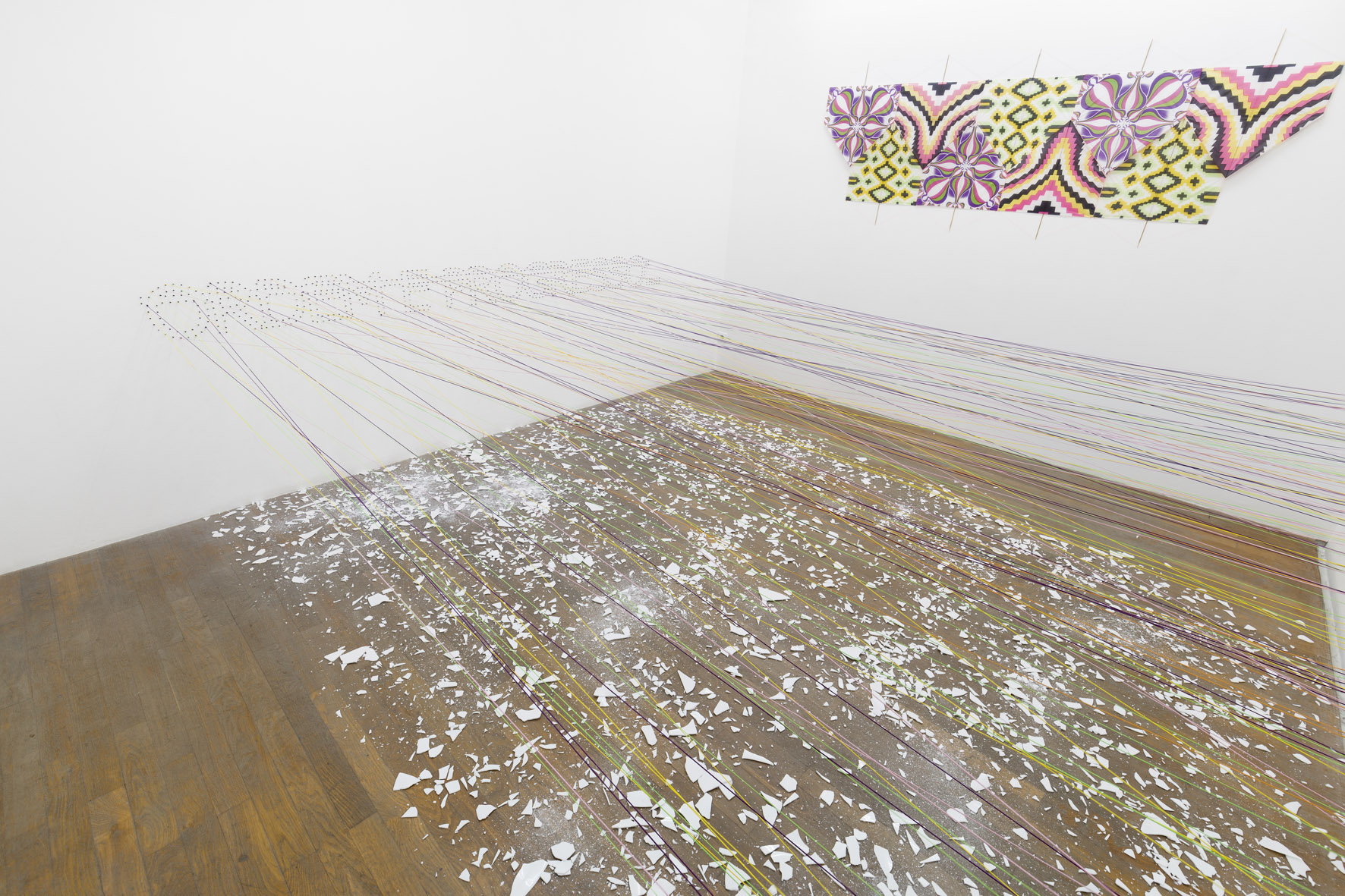
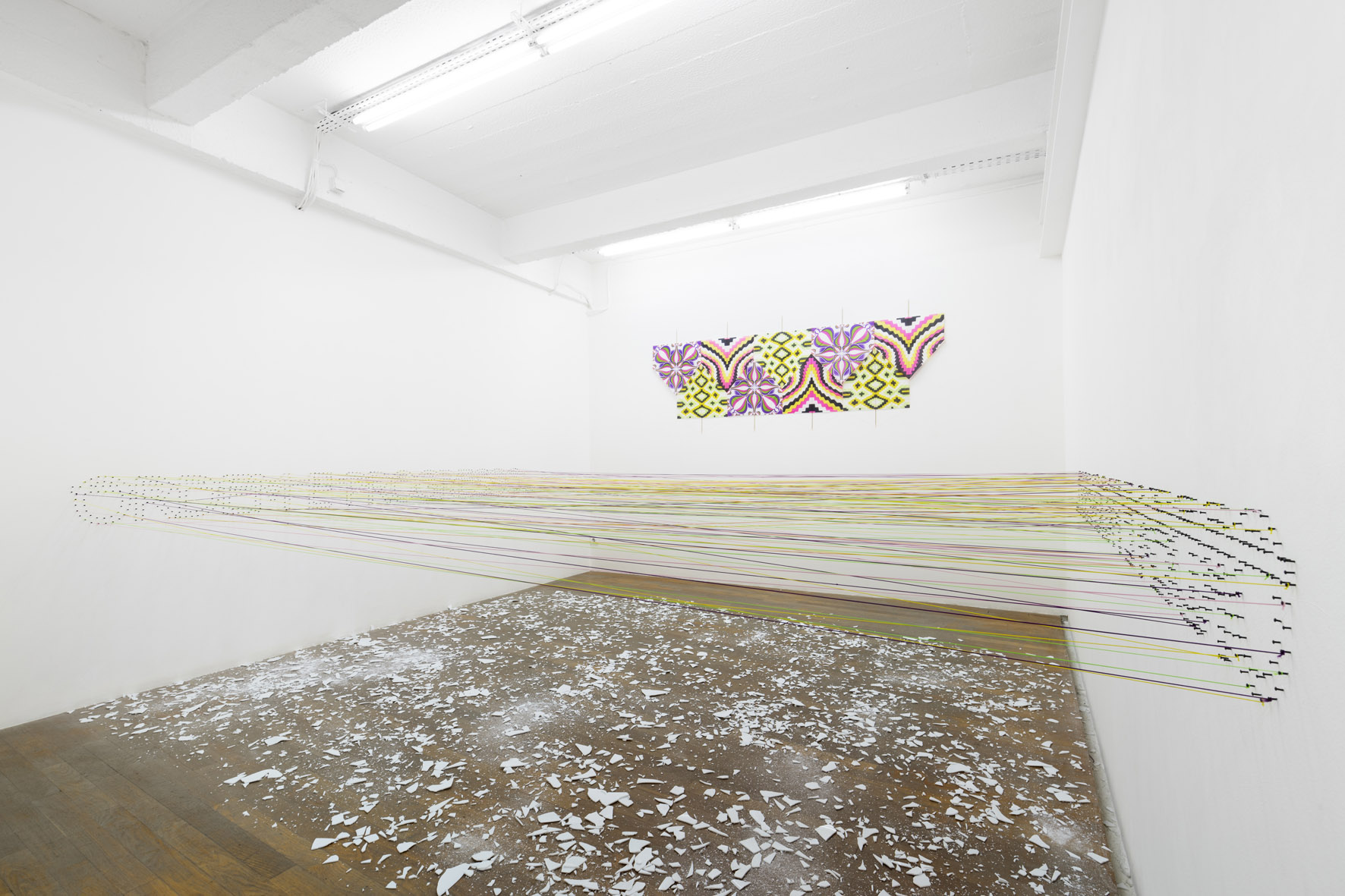
photos : Jérôme Michel
COMMUNIQUÉ EN FRANÇAIS CI-DESSOUS
Backslash is delighted to announce a new exhibition of work by Rero. The French artist has expanded the scope of his artistic explorations over recent years with residencies in the USA and South America. Three years after his last exhibition at the gallery, he has chosen to name the new show IBID., the Latin abbreviation for ibidem, ‘in the same place’, to express his desire to return to a material space he has already engaged with. However, instead of crossing out the word with his usual thick line, he has opted to alter it with the aphorism ÉPUISEMENT DES IDÉAUX [Waning of Ideals], thus questioning the archetypes of perfection our minds devise with no link to reality. Rero sees the new exhibition as highlighting our desire and/or need to begin a transitional phase marked by a more pragmatic attitude. Such a transition involves following various alternative paths that could serve to reunite us with our ideals and prevent their depletion.
The exhibition presents a summary of Rero’s investigations over recent years when he travelled across the American continent, stopping off at a variety of places from Rio de Janeiro and the Candelaria district of Bogota to California. Each of his sets of works questions one of our ideals, whether cultural, determinist, political, social, financial, virtual or simply human, looking at that the path we would ideally like to follow in the same spirit as Kallipolis, the ideal city Plato describes in The Republic.
Our virtual ideal and our relationship to the digital are defined by an immersive installation on the ground floor on the theme of F.O.M.O. (Fear Of Missing Out). This fear is a form of social anxiety, whereby people are worried about missing an important piece of news or some other event that serves as an occasion for interacting socially. Although it affects young people’s concentration in particular, other generations are not spared.
Our social ideal draws on François Truffaut's film Fahrenheit 451, based on Ray Bradbury’s novel, proposing a series of burned books enclosed in resin that tackle the theme of censorship and self-censorship and refer to error code 451 for web pages inaccessible due to legal reasons. The figure 451 is the temperature in degrees Fahrenheit at which paper ignites without the need for an external flame.
Our financial ideal is questioned by Rero’s use of local currency notes, including the Brixton pound featuring David Bowie which is already circulating in London, thus underscoring feasible alternatives in how we choose to handle financial transactions.
Our political ideal is addressed with an installation of kites made in Rio de Janeiro, where they are used in the favelas to warn people about the imminent arrival of the forces of order and as ‘weapons’ by members of a community to settle disputes.
Our determinist ideal is defined by a series of canvases featuring expressions based on the double bind concept as defined by Paul Watzlawick, a founding member of the Palo Alto Group, who illustrated the concept by proposing the example of a motorway sign saying ‘ignore this sign’. Here Rero is seeking to activate individual resources for each and every one of us, so we can come to terms with and distinguish ourselves from all that is imposed on us.
With this series of works and a consistently humorous touch, Rero draws our attention to an imminent change in society, a change we can take control of by means of the alternative paths that are the exhibition’s main theme. He wants to highlight the limits of an ageing system that ossifies our reality as well as our ideals.
A 230-page monograph is being published to mark the exhibition. Available as a limited edition of 150 signed copies, it provides a compilation of Rero’s explorations over the last ten years.
Rero’s work has been exhibited at a wide range of museums, including the Centre Pompidou and Grand Palais in Paris, MAC/VAL in Vitry-sur-Seine (south of Paris), MAC in Bogota and Caixa Cultural in Rio de Janeiro, Sao Paulo and Brasilia.
\
Backslash est très heureuse d'annoncer la nouvelle exposition de l'artiste français Rero dont les recherches se sont enrichies ces dernières années à travers ses résidences aux Etats-Unis et en Amérique du Sud. Trois ans après sa dernière exposition à la galerie, il choisit de nommer sa nouvelle proposition IBID., abréviation du latin ibidem pour « même endroit », afin d’exprimer sa volonté de retourner dans un espace réel déjà investi. Cependant, au lieu de rayer ce mot d’un trait épais, comme à son accoutumée, il décide de le raturer par l’aphorisme ÉPUISEMENT DES IDÉAUX et questionne ainsi les archétypes de perfection que notre esprit peut concevoir indépendamment de la réalité. Pour Rero, cette nouvelle exposition met en exergue notre volonté et/ou notre nécessité d’entamer une phase de transition dans une attitude plus pragmatique, en empruntant différentes voies alternatives qui pourraient nous rapprocher de nos idéaux tout en évitant l’affaiblissement.
L'exposition présente un résumé de l'ensemble des recherches de Rero de ces dernières années à travers le continent américain, notamment à Rio de Janeiro, dans la Candelaria de Bogota, mais aussi en Californie. Chacun des ensembles d'œuvres questionne l'un de nos idéaux, qu'il soit culturel, déterministe, politique, social, financier, virtuel, mais aussi tout simplement humain ; ce que l’on souhaiterait idéalement suivre, à l’image de Kallipolis, la cité idéale que décrivait Platon dans La République.
Notre idéal virtuel et notre rapport au numérique sont définis par une installation immersive, au rez-de-chaussée, sur le thème de F.O.M.O. (acronyme de Fear Of Missing Out). La peur de manquer quelque chose est une sorte d'anxiété sociale, celle de manquer une nouvelle importante ou un autre événement quelconque donnant une occasion d'interagir socialement et affectant particulièrement la concentration des jeunes mais qui pertube également les différentes générations.
Notre idéal sociétal s'inspire du film Fahrenheit 451 de François Truffaut, tiré de la nouvelle de Ray Bradbury, et propose une série de livres brûlés enfermés sous résine abordant le thème de la censure et l’autocensure, référence au code d'erreur 451 d'une page web inaccessible pour des raisons d'ordre légale. Le nombre 451 est la température en degrés Fahrenheit à laquelle le papier s'enflamme sans besoin d'une flamme extérieure.
Notre idéal financier est remis en question par l'intervention de Rero sur des billets de monnaie locale, notamment la livre de Brixton, à l'effigie de David Bowie, déjà en circulation à Londres, soulignant ainsi les choix alternatifs envisageables dans nos échanges financiers.
Notre idéal politique est présenté par une installation de cerfs-volants fabriqués à Rio de Janeiro, engins utilisés dans les favelas afin de prévenir de l'arrivée des forces de l'ordre mais aussi moyen pour les membres d'une communauté de régler leurs différents en s'affrontant par ces « armes ».
Notre idéal déterministe est défini par une série de toiles dont les expressions suivent le précepte de double contrainte (double bind) défini par Paul Watzlawick, membre fondateur de l'Ecole de Palo Alto, qui proposait comme exemple pour illustrer ce concept un panneau autoroutier indiquant « ignorez ce panneau ». Rero tente ici d'activer les propres ressources de tout un chacun à digérer et à se démarquer de ce qui nous est imposé.
Avec cette série d'œuvres et toujours avec humour, Rero attire notre attention sur le changement de société imminent dont nous pourrions prendre les commandes, notamment par des voies alternatives, thème principal de l'exposition. Il veut mettre en évidence les limites de notre système vieillissant qui ne sclérose pas seulement notre réalité mais également nos idéaux.
Une monographie, de 230 p., en édition limitée et signée de 150 ex., regroupant les recherches de Rero sur les dix dernières années, est publiée à l'occasion de l'exposition.
Le travail de Rero a été exposé dans de nombreuses institutions, notamment au Centre Pompidou, au Grand Palais à Paris, au MAC/VAL, au MAC de Bogota ou à la Caixa Cultural de Rio de Janeiro, Sao Paulo et Brasilia.
